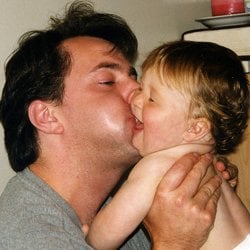Exclusive Interview: Dear Zachary Director Kurt Kuenne

Kurt Kuenne is a friendly, open guy, so I was sorry to walk into a room and immediately tell him "Your movie was emotionally devastating." But that's a response he's gotten often with Dear Zachary: A Letter to a Son About His Father, the documentary that was the hit of Slamdance this year and goes into theaters today with a 100% Rotten Tomatoes score.
He began making the movie in 2001, when his best friend from childhood, Andrew Bagby, was murdered by ex-girlfriend Shirley Turner. Kurt traveled across the country and the world collecting interviews with Andrew's family and loved ones, weaving those interviews with home movies he and Andrew had made as kids. In the meantime Andrew's parents, Kate and David, were in Canada, waiting for the results of Shirley's extradition trial that would bring her back to the United States and, hopefully, to jail. But when they found out Shirley was pregnant with Andrew's baby, Kurt's goal changed-- he was now making a movie for Andrew's son, to be named Zachary, to know his father. And as the trial proceeded from there, and as the Canadian government failed the Bagby family again and again, Kurt's movie had to change as well.
A huge twist near the end of the movie makes it difficult to talk about Dear Zachary in detail, but Kurt did his best to talk to me about his process making the movie as funny as possible given the circumstances, and how he decided to release such a personal documentary to begin with. Dear Zachary is a small movie but one definitely worth seeing, as Kurt explains better than I ever could below.
How did you decide to make this a movie that you wanted other people to see?
Obviously, this was only intended for family friends and recipients of Andrew's scholarship funds. The decision [to release it] came about, because, the outcome of the case was, shall we say, unacceptable. I and Andrew's parents felt it was important to tell this story to the world in hopes of preventing a recurrence of what happened here. Did you have to ask the Bagbys permission to release it?
It's weird, because we never really had conversations about it. We always just understood. When I started it, it was a tribute film, and they were just thrilled that I was doing it. Because they wanted to see it too. They wanted to have all the memories of Andrew in one place for themselves. When the case did not go well, I became aware that Andrew's father was writing a book, and they were going public. Myself, I started realizing, I wonder if I should be putting this out publicly. We never had a conversation about it. I just heard them talking to someone about it, and they said "When Kurt's movie comes out..." We just sort of unspokenly knew what we had to do here.
You had to decide how much of yourself to put in the movie. How did you pick and choose there? Was it all done in editing?
Your Daily Blend of Entertainment News
All those decisions were made in editing, because obviously the story changed very much from the movie I originally intended to make. I didn't start cutting anything until a year and a half ago. I kind of looked at this movie kind of like Citizen Kane from a documentary perspective. I'm the shoulder over which you're looking. The movies kind of have structural similarities-- it's a guy driving around, asking people questions about someone who's dead. Except in Citizen Kane, the shoulder is knot involved in the story. It's appropriate for me to express my emotions and be involved in it. The movie is completely my point of view. It's highly subjective. I think all movies are subjective, I just admit it in this film. I didn't want it to become the Kurt show. I tried to keep my face off camera as much as I could. I tried not to narrate more than was absolutely necessary. I did not want myself to upstage what I thought was the real story here, which was Andrew and his parents.
A lot of the subjectivity comes in the stylistic choices you make. How did you make those?
There's a critic who said this better than I could, who said that it's not hard to see where his personal bias enters in, but it's not hard to see the facts underneath. Looking at it that way, I tried to make sure that I was presenting the facts, but you could tell how I felt about it.
The part that I'm thinking is a scene where you see footage over and over, the screen turns red, there's loud music. That's a very subjective moment.
I've heard different reactions. I've heard people say that really affected them, and some say it's over the top. My argument is it can't be over the top, because I'm giving you what I experienced. That's the color I saw in my head. That's not overdramatic, it really was that terrible. In fact, it was worse. What I was trying to do in the film was give you the cinematic equivalent of the emotional experience I had. Sometimes that's hard to watch, sometimes it's too much for certain people, sometimes it's just right.
Did you structure the movie intentionally to tell the story as you experienced it, or to provide the narrative twist at the end?
I wanted to give people the exact experience we had, in real time with the information that we had, with the information that the government had at the time, that they failed to act on appropriately. If you experience it in our shoes, you'll get it. When people see often times an article about a crime in a newspaper, they'll say oh that's terrible, and then they move on. They don't necessarily act on it or do anything about it, because they don't know the person. My goal was to make people, by the end of this movie, feel like they knew the people and were part of this family, so they would feel personally attacked and want to do something. It seems to be working. My original goal, when I started this, was to bring Andrew back to life, for people who didn't get to meet him. At festivals, people are saying 'I feel like I know him.' I thought, wow, the original intent of the movie still is intact. Andrew was a very social creature, the only person I've ever met who was asked to be best man by seven different people. It's just like him to be making thousands of new friends seven years after his death.
You chose not to show anything from Shirley's perspective, or to interview her family. Why?
As the title says, the movie is a letter to a son about his father, not a letter to a son about his parents. I knew his father, so I was trying to capture the person who was taken, so he could know him when he got older. In terms of Shirley's perspective, I think our media in general tends to focus a lot on killers and why they do things and what's going on in their mind. I really don't care. There is no excuse for unloading a gun into my friend's face because he didn't want to date you. There's no excuse for that. I don't care what her motivations are, I don't care what was done to her as a child. That was a choice that she made. I really don't have interest in the point of view of somebody who did something inexcusable.
What's been the experience of promoting a movie that's so personal like this? And it's also gotten so much attention.
It's interesting, because I'm principally a fiction guy, who's more into the comedic stuff. I tried to make this movie as funny as I could, because i wanted it to mirror Andrew's personality. People are listening, and i feel really fortunate about that. I wish I'd never had to make this film in the first place. I wish Andrew were alive, and I was off making more silly comedies. I sort of went through some soul-searching when Andrew was killed, thinking, 'Man he was a doctor, and he was healing people, and what am I doing? I'm making things up-- what value does that have?' I came to the conclusion that a doctor heals people, and once they're well, what do they want? They want to laugh, they want to be inspired. If I can make people happy, that's the best I can do. That's why I started focusing more on things that were uplifting. Like in Sullivan's Travels, the famous line-- 'There's a lot to be said fro making people laugh. That's all some people have.' Life is depressing enough-- people don't need to be made to feel bad by something someone made up.
Staff Writer at CinemaBlend

